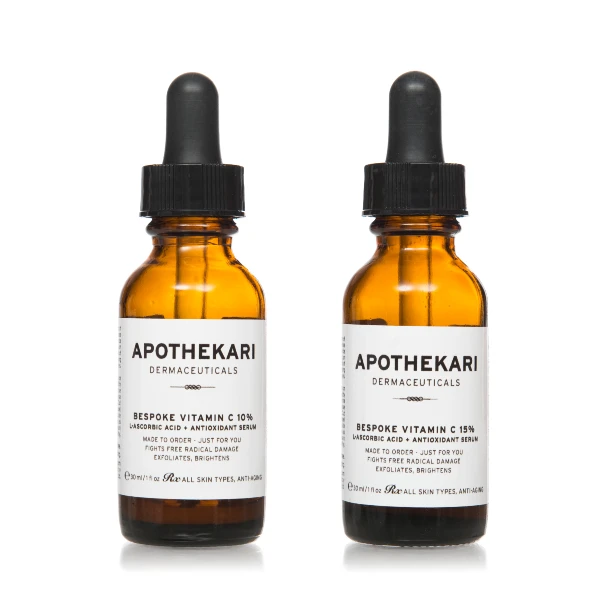If I had to make a list of my favorite skin care products, a Vitamin C Serum would get top billing. That, along with an SPF 30+ sunscreen and a retinoid treatment, would round out the list of my three must-haves.
We know Vitamin C as the vitamin that prevents scurvy, but it’s also essential to our overall health, including that of our skin. Today’s post is dedicated to this amazing, superstar ingredient. Let’s take a closer look so that you know how to find a Vitamin C serum that’s just right for you and your skin.
What Can A Vitamin C Serum Do for Skin?
I’ve written about Vitamin C and its skin benefits before, but in this post, let’s get into the nitty gritty. While ascorbic acid/ L-ascorbic acid is the form of Vitamin C that is most well known, it is also available in several other forms. When it comes to skin care, you may find sodium ascorbyl phosphate, ascorbyl palmitate, retinyl ascorbate, tetrahexyldecyl ascorbate, magnesium ascorbyl phosphate, and ascorbyl glucoside along with others included in a range of products such as serums, lotions and moisturizers. All of these forms have skin benefits, but none compare to l-ascorbic acid when it comes to the amount of research and clinical studies to back up its use in skin care. For that reason, it’s the form of Vitamin C we love most at Apothekari and why you’ll find it included in our Bespoke Vitamin C Serums.
Vitamin C is an essential nutrient involved in tissue repair and the enzymatic production of certain neurotransmitters. It is required for the optimal functioning of several enzymes and is also important for the immune system. Lastly, it functions as an antioxidant, helping to protect against free radical damage. A diet high in vitamin C can help to boost your overall wellness, but in order to get adequate concentrations to the skin, a topical treatment works best.
A Vitamin C Serum can provide a range of benefits including:
- Evening out your skin tone by decreasing melanin synthesis associated with pigmentation
- Protecting skin from damage caused by pollution
- Improving skin hydration, and
- Boosting collagen production to help keep wrinkles at bay.
When properly formulated, ascorbic acid helps create more youthful and firmer looking skin that looks brighter and more evenly toned. Ascorbic acid by itself is a pretty sweet ingredient but it benefits from the addition of other antioxidants who work in conjunction with it to deliver the ultimate in free radical protection.
If you’re convinced that you need to have Vitamin C in your routine, here’s how to determine if the one you’re considering is the right one for you:
- Look for L-ascorbic acid or ascorbic acid listed as one of the active ingredients. While it is a finicky ingredient to work with (it’s light and air sensitive), it is also delivers the biggest bang for your buck. Other derivatives do work, but none pack quite the same punch.
- Ensure that the ingredient is listed high up in the ingredients list to ensure you are getting a product with enough potency. Some companies disclose the concentration in their formulation and when it comes to ascorbic acid, look for at least 10%.
- While highly effective, L-Ascorbic Acid cannot be tolerated by some skin types. If this is the case, opt for a lower concentration (up to 10%) or seek an alternate form of Vitamin C like sodium ascorbyl phosphate, tetrahexyldecyl ascorbate or magnesium ascorbyl phosphate. They are also effective and you will see results, but they may take longer.
- Look for opaque packaging and if possible, an airless pump to help protect the formulation.
- Vitamin C benefits from other antioxidants, including other forms of vitamin C but also ingredients including green tea, vitamin e, ferulic acid, alpha lipoic acid, etc. If your Vitamin C serum contains additional ingredients as well, it’s likely to do more for your skin.
Use a Vitamin C serum in the morning when it will help to protect against free radical damage that we encounter during the day. I layer it on first thing after washing or splashing my face and before I put on my sunscreen. Sunscreen plus an antioxidant like Vitamin C is a winning combination as I’ve outlined previously. It is possible to use it at night, but it may be too much for your skin used in conjunction with other treatments including a retinoid or alpha hydroxy acids.
When it comes to a Vitamin C Serum, do you have a favourite?





